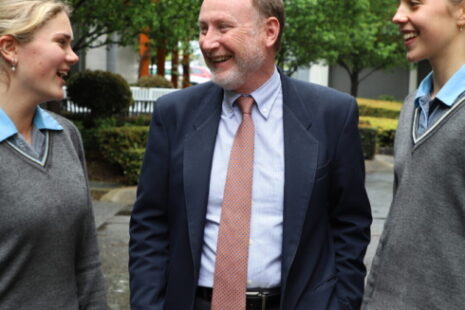Stress, Anxiety and Girls

This week, Michelle Carroll explores stress, anxiety and girls, providing insights from Dr Lisa Damour, PhD who highlights the importance of taking stress and anxiety in the lives of our girls and turning it into fuel for growth.
During my sabbatical, I enjoyed finding time for a podcast walk around 3.30pm each day when I would usually be found at the Heyington Gates. The beach stretch between Peregian Beach and Coolum was my favourite podcast stroll, but it is also hard to go past the colours of the Kimberley at Cable Beach, Western Australia.
I had previously not been accustomed to the world of podcasts; suffice to say I am now a convert. Leadership, girls’ education, and academics were my ‘go to,’ but I also extended to various Australian-based mysteries that can lead to interesting conversations with friends and family also sharing their favourite listening.
The Alliance of Girls’ Schools Australasia has recently released a series of podcasts with leading American Psychologist, Dr Lisa Damour, PhD. Author of two New York Times bestselling books: Untangled – Guiding Teenage Girls through the Seven Transitions into Adulthood and Under Pressure – Confronting the Epidemic of Stress and Anxiety, Lisa has led some refreshing thinking on our approaches to caring for girls post COVID, in particular, working through the challenges of anxiety disorders that arose during adolescents at this time.
In her podcast, Damour discusses stress, anxiety, and girls, highlighting the impact of the global pandemic and the opportunity for schools and teachers to normalise students’ experiences of stress and anxiety and in doing so, opening new paths for cultivating resilience.
Damour’s key discussion relates to how we take stress and anxiety and turn it into fuel for girls. What does it mean for everyone in the world to experience psychological distress, not equally distributed, but certainly a universal experience over these past two years?
Damour believes we need to change how we talk about mental health, how we talk about stress, how we talk about anxiety and how we make sense of it and make use of it. Damour considers our current language and approach to mental health to be problematic – starting with the definition of mental health. A definition that suggests you are (only) mentally healthy when you feel calm and relaxed.
 Whilst the belief that you are mentally healthy when you feel good is okay, this is a hugely problematic definition because it is not something that is ever fully attainable, nor is it something you can sustain for very long.
Whilst the belief that you are mentally healthy when you feel good is okay, this is a hugely problematic definition because it is not something that is ever fully attainable, nor is it something you can sustain for very long.
As such, Damour is keen to reset the definition of what mental health is today. Damour prefers to define mental health as when you have the ‘right feeling’ at the ‘right time.’
For example, if you lose someone you love, you feel sad and experience grief. During this time, we can learn how to manage that sadness and grief effectively. Another example is when someone crosses you, or if somebody does something awful – feeling angry is evidence of mental health. That is the right feeling at the right time, especially when it is paired with the ability to manage that anger effectively.
The current definition of mental health (feeling calm and relaxed all the time) seemed to gain traction alongside the growth of the ‘wellness industry.’ The commercialisation of ‘wellness’ with the sale of products that promise wellness sits alongside an extensive range of commercial products that ‘sell’ you wellness and are designed to help you feel good.
Over time, Damour has become increasingly suspicious about the ‘sale of the idea’ that we are supposed to feel good all the time. The reality is we have a wide range of emotions, some positive, some negative, some light, some dark.
Damour is encouraging educators to reset the definition of mental health with the notion of ‘right feeling at the right time.’ With this new definition, a new language and a new discourse can exist about anxiety and stress.
Psychologists have always considered anxiety to be a normal healthy emotion. It is a fundamentally protective emotion as it is an alarm that rings when something is not right. In essence, we should overwhelmingly frame anxiety as a friend, the ‘right feeling at the right time’ is telling us something is off track, telling us it is time to pay attention.
For girls, we need them to also see their anxiety as normal and healthy. We want them to actually embrace it and recognise its usefulness as a signal that it is time to pay attention. Looking at anxiety through this different lens allows us to witness its benefits, that in almost all situations it is operating as a healthy signal to reassess, make adaptations and grow in capacity
Damour stipulates that to allow stress and anxiety to be ‘growth-giving’ girls must be provided with ‘restorative intervals,’ opportunities for them to socially connect with other people, participate in enjoyable distractions and enjoy moments of self-care, to help them grow and build their capacities after stressful or anxious moments.
Whilst young people can revert to social media to connect, this can be likened to a slot machine, where you are not always sure what you are going to receive back. What we hope for are connections that provide a more guaranteed return, authentic connections with their peers, families and teachers that reinforce to them that they are known, they are loved and they are accepted.
Our Year 9 Cohort, currently immersed in camp life in Western Australia are enjoying the opportunity to make these real connections, and I to, am looking forward to reconnecting with the girls whilst on camp with them. I am curious to understand more deeply how they connect with each other, sans phones and social media, left with face-to-face conversations and restorative time to create enjoyable memories together.





